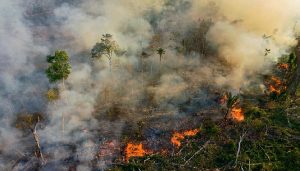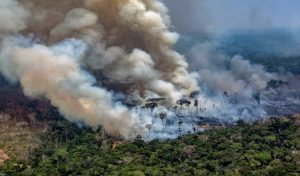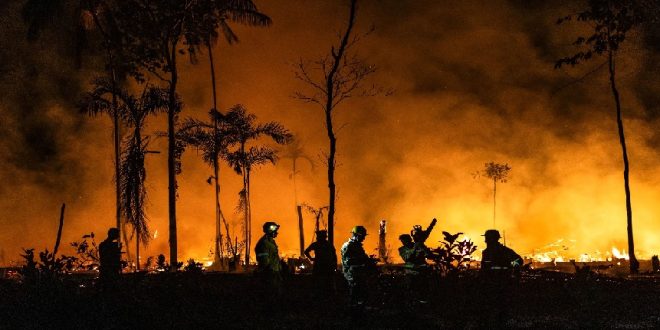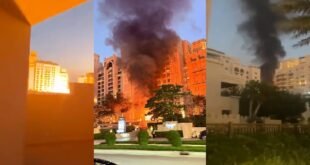11-06-2024
BRASILIA: Firefighters are battling wildfires in Brazil’s Pantanal, the world’s largest tropical wetland.
The Pantanal is home to jaguars, giant anteaters and giant river otters.
Close to 32,000 hectares have already been destroyed by the fires in the state of Mato Grosso do Sul, local media report.
 Climate experts say this year’s wildfire season has started earlier and is more intense than in previous years.
Climate experts say this year’s wildfire season has started earlier and is more intense than in previous years.
Firefighters said their efforts to extinguish the flames were being hampered by high winds over the weekend.
The region has also seen less rain than in other years, which has made it easier for the fires to spread.
The number of fires from the start of the year up to 9 June has been 935% higher than in the same period last year, according to figures from Brazil’s National Institute for Space Research (INPE).
The rise is particularly worrying as the high season for wildfires is not due to start until July.
Mato Grosso do Sul state authorities declared an environmental state of emergency in April, saying low levels of rainfall were creating ideal conditions for wildfires.
The number of fires so far in 2024 is the highest since 2020, which was the worst year on record in terms of Pantanal fires.
In that year, about 30% of the Pantanal was consumed by fire.
The difference in the number of fire outbreaks so far this year compared to last year is already staggering.
Between 1 January and 9 June 2023, 127 fires had been reported. In the same period this year, that number was 1,315.
Vinicius Silgueiro from local NGO Instituto Centro da Vida told media that “what is most worrying is that even in the rainy season, we had this increase in fires”.
 Silgueiro warned that the situation would probably deteriorate further at the peak of the dry season in August and September.
Silgueiro warned that the situation would probably deteriorate further at the peak of the dry season in August and September.
Last week, Brazil’s federal government announced it would work together with the state governments of Mato Grosso do Sul as well as those in the Amazon region to combat wildfires.
Environment Minister Marina Silva said it was key to respond to fires more quickly while also doing more to prevent them from breaking out in the first place.
In November last year firefighters in Brazil’s Pantanal wetlands earlier this month celebrated the end of the fire season on Facebook, saying in a Nov. 7 post that “it is a relief for everyone who lives in the region.”
In the first two weeks of November, fires fueled by unusually dry and hot weather destroyed nearly 770,000 hectares (1.9 million acres) of the world’s largest tropical wetlands, preliminary figures from the Federal University of Rio de Janeiro show. This accounts for 65% of the damage done by fires in the region this year.
Brazil’s National Institute for Space Research, a federal agency, detected 3,380 fires in the Pantanal in the first 17 days of November, compared to just 69 in the same period a year ago, and well beyond previous fire season records dating back to 1998. The Pantanal holds thousands of plant and animal species, including 159 mammals, and it abounds with jaguars, according to the World Wildlife Fund. During the rainy season, rivers overflow their banks, flood the land and make most of it accessible only by boat and plane. In the dry season, wildlife enthusiasts flock to see the normally furtive jaguars lounging on riverbanks, along with macaws, caimans and capybaras. (Int’l Monitoring Desk)
 Pressmediaofindia
Pressmediaofindia




